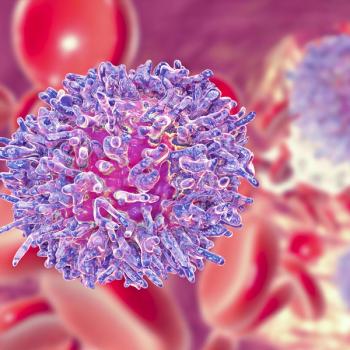
The use of metastasis-free survival as an end point for clinical trials in nonmetastatic castration-resistant prostate cancer has been given finalized guidance by the FDA.

Your AI-Trained Oncology Knowledge Connection!


Hayley Virgil is a senior editor with CancerNetwork. When she isn't traveling to conferences and championing health equity in the oncology space, she can be found hiking, foraging wild plants, gardening, sewing ballgowns, practicing embroidery, or playing video games.

The use of metastasis-free survival as an end point for clinical trials in nonmetastatic castration-resistant prostate cancer has been given finalized guidance by the FDA.

Early phase data indicate that elranatamab may be a safe and efficacious treatment for patients with relapsed/refractory multiple myeloma

Black veterans within the United States who could stand to highly benefit from definitive treatment were found to be less likely to undergo treatment than non-Black populations.

Pediatric and adolescent patients with acute lymphoblastic leukemia experienced similar outcomes when treated with either calaspargase pegol or pegaspargase.

Results of the phase 3 EMPOWER-Lung 3 trial support the use of cemiplimab in advanced or metastatic non–small cell lung cancer.

Patients with EGFR wild-type non–small cell lung cancer experienced a survival benefit with the addition of plinabulin to docetaxel in the second- and third-line settings.

The accelerated approval status for romidepsin for the treatment of patients with relapsed/refractory peripheral T-cell lymphoma has been withdrawn following the results of the confirmatory phase 3 Ro-CHOP trial.

Myriad Genetics’ RiskScore offers personalized polygenic breast cancer risk assessment to undiagnosed women of all ancestries.

Combination ivosidenib/azacitidine has yielded notable improvements in survival over ivosidenib alone in IDH1-positive treatment-naïve acute myeloid leukemia.

Racial and ethnic disparities in incidence and risk of childhood cancer have been identified across a number of malignancies.

Novel eganelisib shows survival-extending potential in patients with triple-negative breast and bladder cancers.

A phase 1/2 trial featuring lanraplenib/gilteritinib in patients with FLT3-mutant acute myeloid leukemia will proceed following the FDA’s clearance of an investigational new drug application.

For patients with large B-cell lymphoma who have undergone treatment with axicabtagene ciloleucel, ctDNA monitoring may help to improve early detection of recurrent disease.

Patients with relapsed/refractory mantle cell lymphoma experienced promising response rates after undergoing treatment with zanubrutinib.

Early-phase data indicate that loncastuximab tesirine-lpyl elicited promising, long-lasting responses in patients with mantle cell lymphoma.

The combination of trilaciclib plus chemotherapy has been granted a fast track designation by the FDA for the treatment of locally advanced metastatic triple-negative breast cancer.

Investigators will continue treating patients with GEN-1 plus neoadjuvant chemotherapy following the results of a pre-planned interim safety review of the phase 1/2 OVATION 2 study.

Results from the phase 3 COSMIC-311 trial indicated that cabozantinib elicited a promising survival benefit in patients with radioiodine-refractory differentiated thyroid cancer.

The updated results of an ongoing phase 1/2 study indicated that CA-4948 achieved promising responses and a tolerable safety profile in patients with relapsed/refractory acute myeloid leukemia and myelodysplastic syndromes.

More elderly, frail patients with colorectal cancer were able to complete adjuvant chemotherapy following geriatric intervention.

Enfortumab vedotin-ejfv has been approved by the FDA for locally advanced or metastatic urothelial cancer.

This year’s Annual Report to the Nation on the Status of Cancer highlights trends in cancer incidence and mortality overall and in key patient subgroups.

The FDA has requested a partial clinical hold on all trials featuring melflufen following the updated results of the phase 3 OCEAN study in relapsed/refractory multiple myeloma.

The FDA released a final guidance on evaluating cancer drugs in patients with central nervous system metastases.

Pembrolizumab has been granted an expanded indication by the FDA for locally advanced cutaneous squamous cell carcinoma.

New findings indicate that historically underserved patient populations with renal cell carcinoma are more likely to receive non–guidance-based treatment.

Ibrutinib and venetoclax may prove beneficial in previously untreated chronic lymphocytic leukemia.

Update from a preplanned clinical trial analysis shows promise of devimistat in relapsed/refractory acute myeloid leukemia.

SNDX-5613 has received a fast track designation from the FDA for the treatment of relapsed/refractory acute leukemias, including acute myeloid leukemia and acute lymphoblastic leukemia.

An integrated review highlights the barriers standing between diverse LGBTQ populations and cancer screenings.